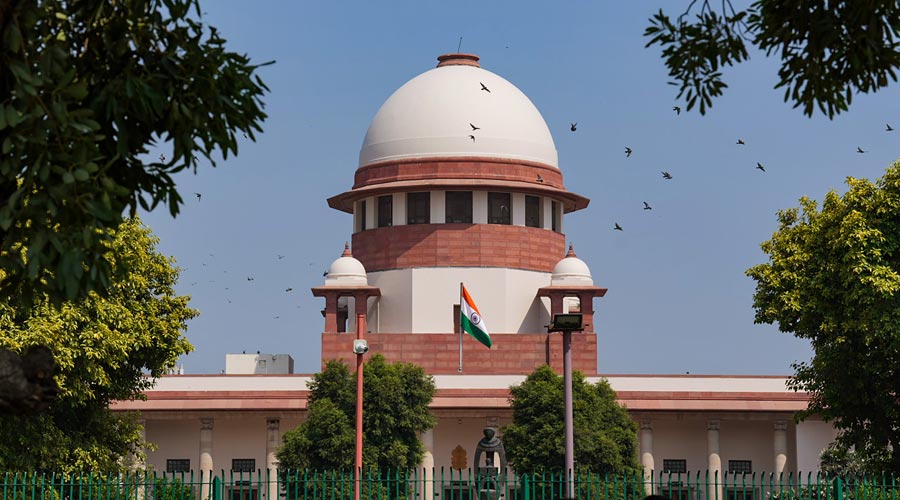Nithyakalyani Narayanan. V
The original complaint, brought by the State of Punjab, challenged the Union’s notification extending the jurisdiction of the Border Security Force (BSF) from 15 to 50 kilometres within the state of Punjab. On January 22, the Supreme Court defined seven major questions that need to be decided.
The bench, which includes Chief Justice of India DY Chandrachud along with Justices JB Pardiwala and Manoj Misra, will determine how to interpret “local limits of areas adjoining the borders of India” as defined by S. 139(1) of the BSF Act 1968 and whether the contested notification dated 11.10.21 is constitutional.
Advocate General Gurminder Singh and Additional Advocate General Shadan Farasat appeared for the State of Punjab while the Union of India (UOI) was represented by the Solicitor General Tushar Mehta.
As a result of the combined recommendations made by the Solicitors for the State of Punjab and the UOI, the Court formulated the following issues:
- Does the defendant’s contested notice, dated 11.10.21, which expanded the border security force’s (BSF) jurisdiction in the State of Punjab from 15 to 50 kilometres, amount to an arbitrary use of power in violation of S. 139(1) of the BSF Act 1968?
- Does S. 139(1) of the Act extend beyond the “local limits of areas adjoining the borders of India” when it comes to the BSF’s increased authority from 15 to 50 km?
- Does S. 139(1) require that all states be considered equally when assessing the “local limits of areas adjoining the borders of India”?
- What elements of the Section must be taken into consideration while interpreting the expression “local limits of areas adjoining the borders of India”?
- Does the contested notification dated 11.10.21 relate to entries I, II, IIA, and other entries of List II, as argued by the defendant, or does it amount to an unconstitutional interference in the state’s legislative domain under Entry I and II of List II of the 7th Schedule of the Constitution, as contended by the plaintiff?
- Will the ruling in State of Madhya Pradesh v. UOI [2011 12 SCC 268] allow for a challenge to the validity of the contested notification dated 11.10.21 in an original suit filed under Article 131 of the Constitution?
- Which costs and reliefs would be applicable in this particular case?
The Court has appointed Mr Harshit Anand (for the State of Punjab) and Mr Kanu Aggarwal (for the Union) as nodal counsels who will prepare a joint compilation regarding all the documentary evidence and precedents etc., which is to be submitted on or before March 31, 2024. It was further directed that no oral evidence would be adduced. The Court had stated in an oral statement during the prior hearing that the State police’s authority has not been affected by the BSF’s enlargement of its jurisdiction. According to the Union, it was an authorised use of force in a border state.
The Background
The Punjab government had filed a petition at the Supreme Court against the Center’s ruling extending the BSF’s authority to conduct searches, seizures, and arrests within a wider area—50 km as opposed to the previous 15 km—from the international boundary in Assam, West Bengal, and Punjab.
In their appeal, the state administration had claimed that the BSF’s expanded territorial jurisdiction infringed upon the states’ constitutional authority. The Punjab government claimed that the notification dated October 11, 2021, violates the Constitution in its entirety because it infringes upon the plaintiff’s plenary authority to legislate on matters pertaining to or essential for maintaining internal peace and public order, and it negates the intent of Entry 1 and 2 of List-ll of Schedule 7 of the Indian Constitution.
On October 11, 2021, the Union home ministry released a notification in this regard, revising an enabling clause from July 2014 for BSF officers and staff who operate in border areas.
The BSF’s authority in Punjab, West Bengal, and Assam was expanded from 15 to 50 kilometres. The boundary in Gujarat, which borders Pakistan, has been lowered from 80 km to 50 km. The distance has remained constant at 50 kilometres in Rajasthan.
The BSF was established on December 1, 1965, and currently numbers roughly 2.65 lakh soldiers. With 192 operating battalions, it is the largest border-guarding force in the country, alongside the Assam Rifles, the Sashastra Seema Bal (SSB), and the Indo-Tibetan Border Police (ITBP).
Name of the case: State Of Punjab v Union Of India
Citation: Orgnl Suit No. 6/2021
Bench: Chief Justice of India DY Chandrachud, Justice JB Pardiwala and Justice Manoj Misra.


